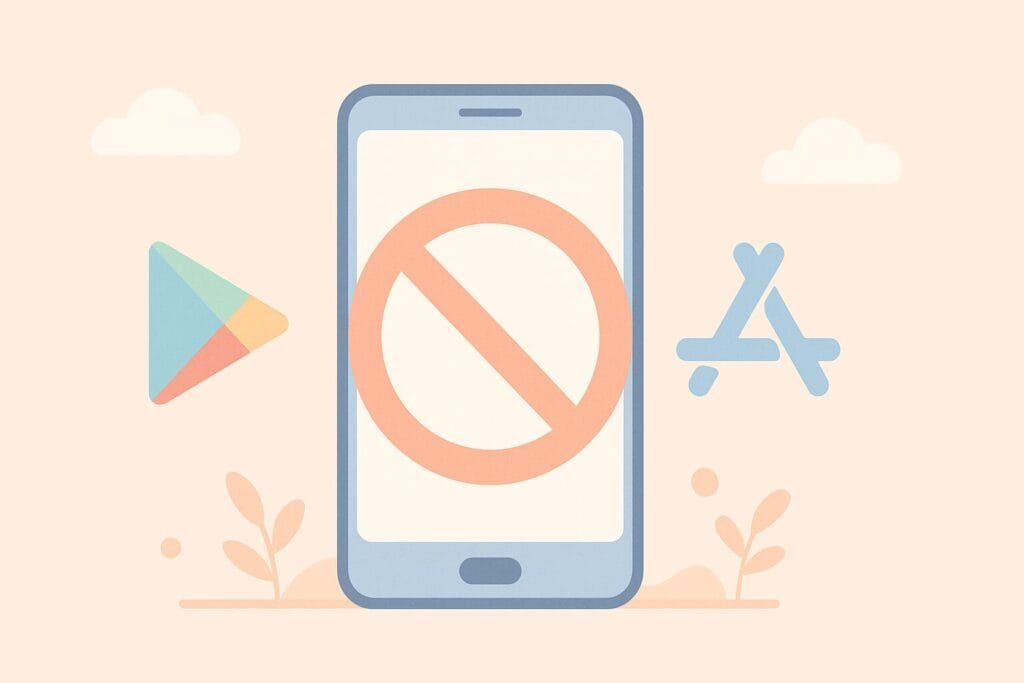Mobile apps have become a core part of digital life, with millions of developers publishing their creations on the Google Play Store and Apple App Store. However, not all apps survive the long run. Many developers face the dreaded message: “Your app has been suspended” or worse, “Your developer account has been terminated.”

So, why does this happen? In this guide, we’ll explore the most common reasons apps get banned, how Google and Apple differ in their policies, and how to prevent your app from being removed.
1. Common Reasons Apps Get Banned
a. Violation of Content Policies
Both Google and Apple have strict guidelines on what type of content is acceptable. Apps that include:
- Pornographic content
- Hate speech
- Misinformation
- Violence or abuse
are quickly flagged and often banned.
b. Misleading Metadata
Using misleading app titles, fake screenshots, or stuffing your description with irrelevant keywords is against both stores’ policies. It’s considered deceptive behavior and may lead to app removal.
c. Repetitive Content or Cloned Apps
Submitting the same app multiple times with slight modifications (like different names or icons) is not allowed. This is considered spam and can lead to developer account termination.
d. Lack of Proper Functionality
Apps that crash frequently, don’t open, or offer no real user functionality may be seen as low-quality and rejected or removed.
e. Malicious Behavior or Malware
If your app collects data without permission, contains hidden code, or manipulates user behavior unethically (like auto-clicks), it’s a major red flag. Even unintentional behavior due to third-party SDKs can cause issues.
2. Policy Differences: Play Store vs. App Store
Here’s a quick comparison between Google Play Store and Apple App Store policies:
| Criteria | Google Play Store | Apple App Store |
|---|---|---|
| Approval Process | Automated + Manual | Heavily Manual |
| App Review Time | A few hours to days | 1–3 days (or more) |
| Policy Enforcement | Algorithmic suspensions common | Manual rejections are typical |
| Frequent Violations | Metadata spamming, ads policy | UI/UX inconsistency, privacy violations |
| Appeal Process | Online form, usually fast | Formal, may take longer |
| Developer Account Risk | Multiple suspensions = ban | 3 strikes policy common |
For detailed policy guidelines, check Apple’s App Review Guidelines.
3. Common Mistakes Developers Make
– Ignoring Privacy Policies
Apps that don’t provide a clear privacy policy or collect user data without disclosure are often suspended. This is especially enforced under regulations like GDPR or CCPA.
– Excessive or Intrusive Ads
Ad monetization must follow strict rules. Full-screen interstitials that are not user-initiated, deceptive ads, or ads shown too frequently can get your app flagged.
– Using Copyrighted Material
If your app uses unlicensed music, images, or trademarks, it risks takedown. Always use content you own or have permission to use.
– Lack of App Updates
Outdated apps that don’t comply with the latest OS requirements or SDK policies may be removed, especially by Google which is stricter about Play Store maintenance.
4. How to Avoid Getting Banned
| Action | Description |
|---|---|
| Follow Developer Policies | Read and understand the latest Google and Apple guidelines. |
| Test Before Publishing | Ensure no bugs, crashes, or UX problems before release. |
| Use Licensed SDKs | Check if third-party libraries comply with policies. |
| Monitor Reviews & Feedback | Negative feedback can hint at policy violations. |
| Avoid Shortcuts | Never buy fake reviews, install bots, or keyword-stuff. |
5. What to Do If Your App Gets Banned
If your app gets suspended:
- Review the violation notice. Google or Apple usually tells you what went wrong.
- Fix the issue. Remove problematic content or code.
- Submit an appeal. Provide clear evidence that the issue has been resolved.
- Be patient. Appeals may take several days or even weeks.
Conclusion
Getting banned from the Play Store or App Store is a nightmare for developers. However, most suspensions are preventable by simply adhering to guidelines, building apps ethically, and respecting user privacy.
Don’t treat policy reviews as a formality—understand and integrate them into your development process. The long-term health of your app and reputation depends on it.

